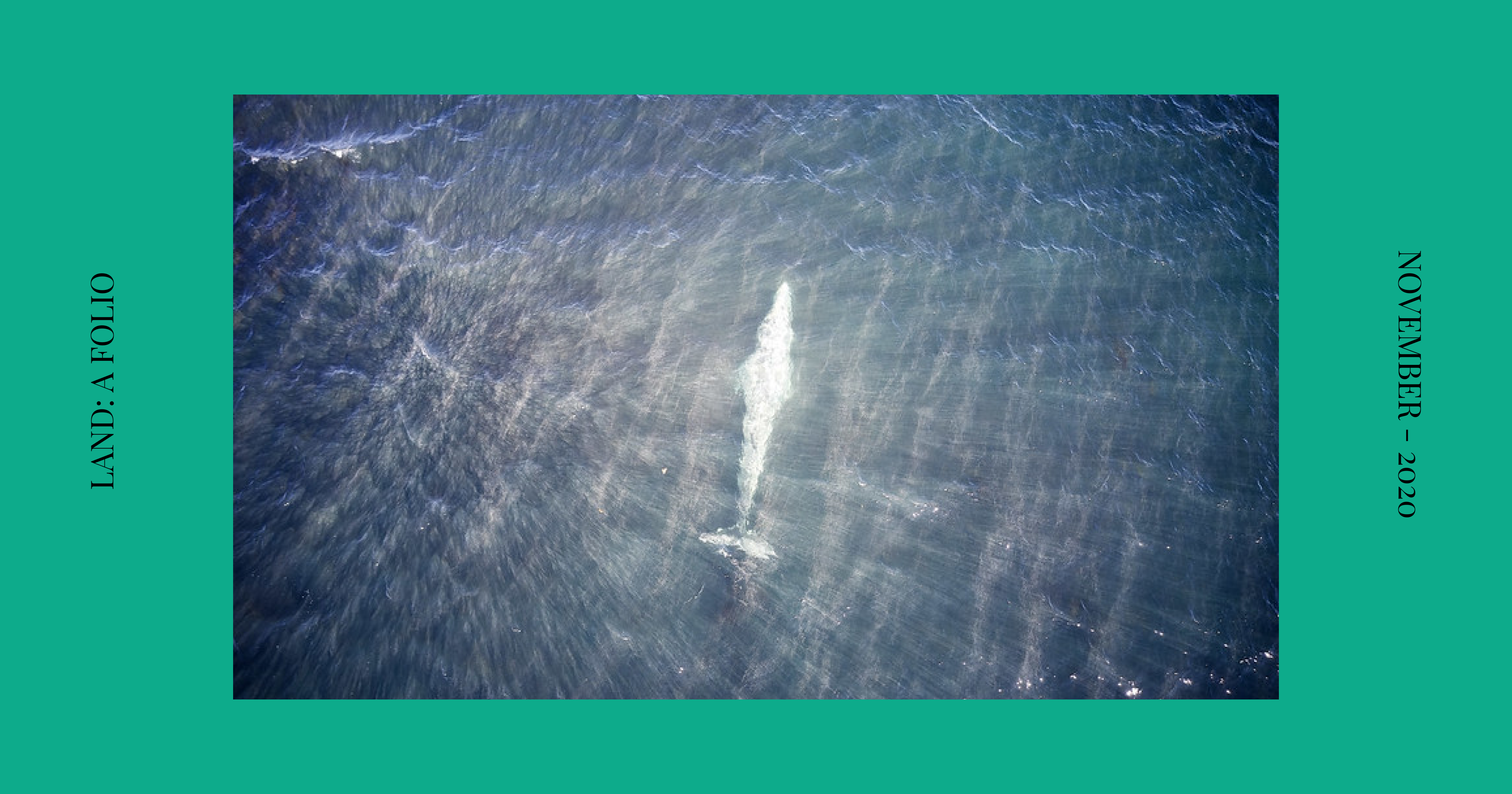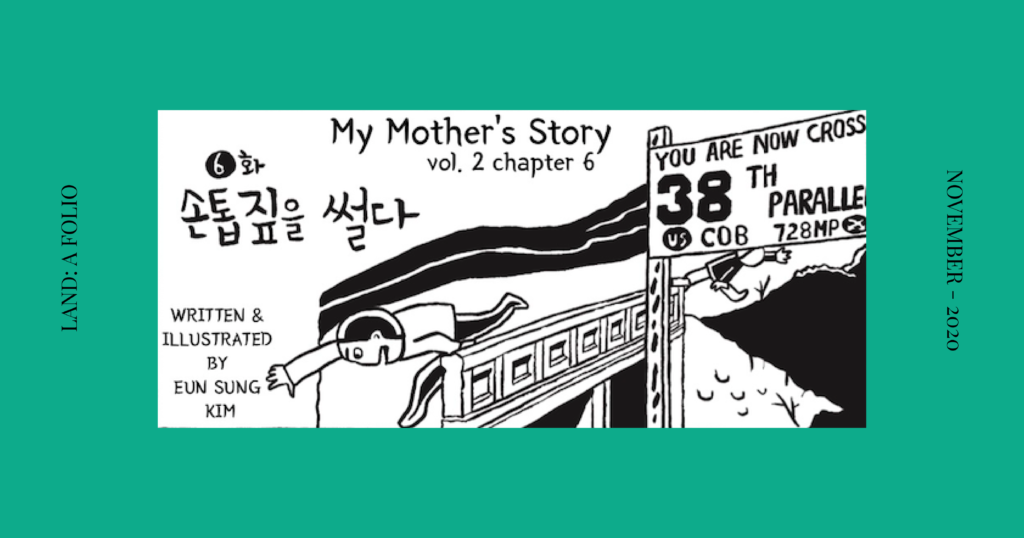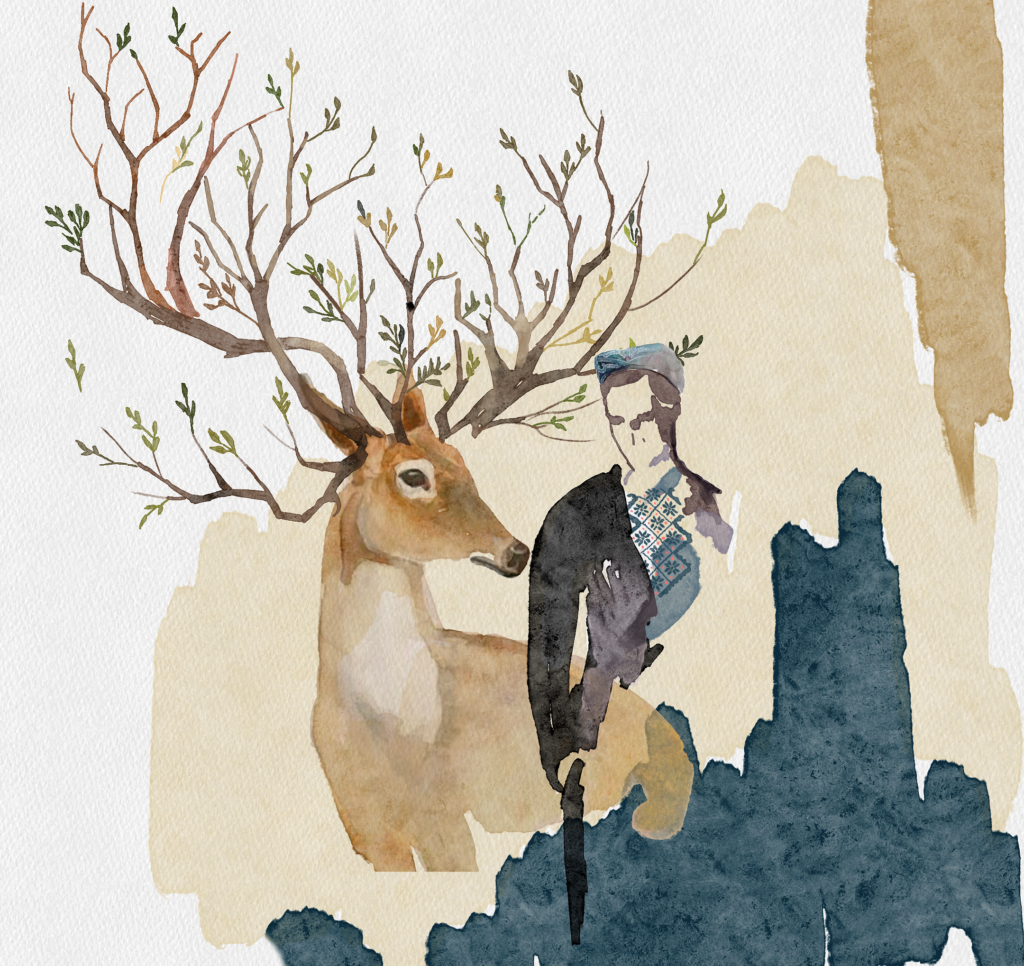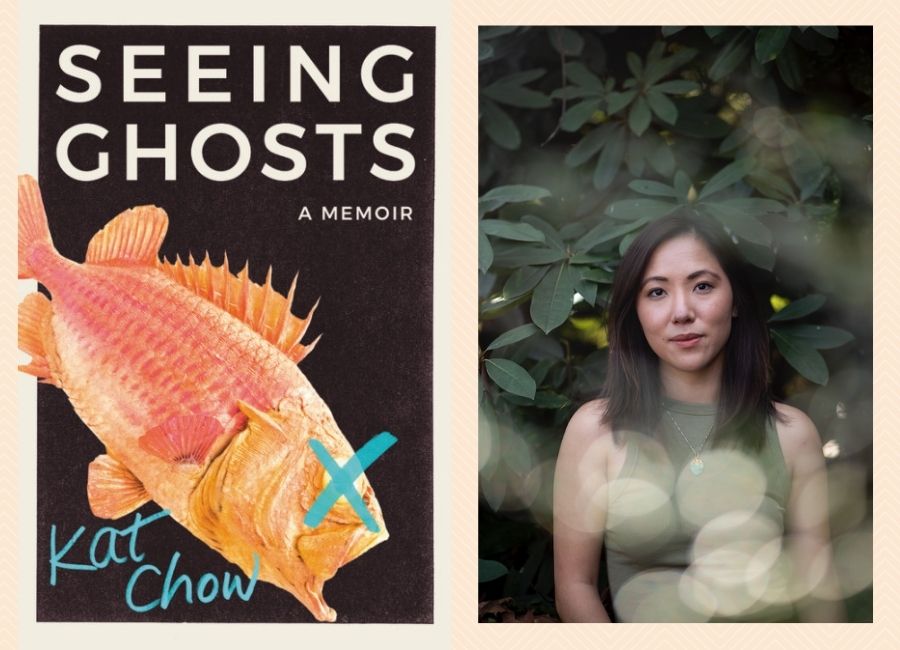There was a time, Abu says, before your great-grandmother, when water was blue because it was a bruise, when it could feel our hands like the skin of a fruit.

First was the great-great-grandmother who married a whale. The whale came with a warranty, “return to the sea cost-free,” and so my great-great-grandmother moved onto a boat, the whale islanding beside her, lifting its tail like a wick to light her whole life. Abu says, when the Dutch and Spanish came with muskets and dogs with corkscrew canines, they banned us from land. Our boats were made of whale ribs, leashed together with ropes of hair. There were women who never made it to the water, who hanged themselves with their own hair, and the dogs spotted their bodies first, barking up into the trees. Centuries later, Abu says the dogs still bark up at trees, that bananas are women’s dangling feet, but I think the dogs are just barking at monkeys, at the birds baked into bullets.
My great-great-grandmother impregnated her whale-wife by being swallowed. Inside the belly of the whale, she embedded her fists into its flesh like egg sacs. In the spring, the whale spat out a flock of fists. There are some breeds of fish, Abu says, that give birth from the mouth—every story bucking out of our throats, born breech, our tongues snipped like umbilical cords. Years later, I read a story about a boy carried inside the mouth of a whale and I think he must be related to me. But I never understood why he left the whale’s body, why he didn’t live there forever, like my great-great-grandmother who knitted new intestines for her whale-wife, whose face was tattooed with a canoe: it’s to carry her home when she’s dead, Abu says, we ride the boats of our bones. When my great-great-grandmother died, the whale pouched her bones in its bowels and beached somewhere in Yilan, where it exploded from the heat and flung its guts so high they wreathed the sun. Children played in the carcass, flossing its ribs with their feet, but the government said its body was a health hazard and had its carcass cremated. Only the whalebones didn’t burn. The children took them home, attached the rib-bones to their legs like stilts, and walked into the sea: they played a mile out from the shore, and from afar, it looked like they were ghost boats, a foreign fleet, an enemy, like the wrecked Nationalist ships that were rumored to resurface, their hulls full of rot.
Of all the fists the whale-wife birthed, only one survived: my great-grandmother. She was washed ashore as a severed hand. The man who plucked her from the sand was my great-grandfather Nunu, who was collecting litter (a genre that included cigarette butts, sullied wigs, and once, a dead dog) after being sentenced to labor. He was arrested for hunting deer on land where it was illegal to wield anything longer than a chopstick—according to Abu, the Dutch claimed they were the ones who taught us to hunt, who showed us how to surround our prey with dogs, who taught us the words fetch, play dead, speak, but we have always known how to eat. He was fined for being a poacher, spent a year in prison, and now scoured beaches with a claw-grabber that wilted like wax and couldn’t grasp anything but unshelled crabs.
He was instructed not to touch any garbage with his own bare hands, especially if the object appeared to be biological weaponry: biological weapons were supposedly delivered from the mainland inside bags of blubber, bombs that detonated upon land. But he lifted the found hand from the sand and loved it instantly, webbed and silver-skinned, eyes on the palm. He loved the way its eyes blinked when he clasped the fingers and so he took the hand home despite being told that all garbage must be incinerated by the end of day, that it was theft to scavenge from the sea, to translate touch into ownership. I told Abu that law didn’t make sense: everyone who ever arrived at the island decided touch was ownership. Abu says that once, we didn’t own our faces, that at birth our features were tilled like fields, our skin reassigned to other animals, our bones, which do not burn, repurposed for buildings. That’s why everything spined is white. Why the tower that pearls the city—its crown of red lights preventing airplanes from veering into it—glistens like whale fat.
My great-grandfather jacked off with the hand he found on the beach that day, cigarette butts barnacled to the back of the hand. He rinsed it first, petting the hand with the back of his blade, and then he came inside its fist. When the hand spoke it opened and shut, thumb twirling like a tongue. The hand preferred to sleep in water, so he swam it inside a plastic tub, sometimes bringing it back to the sea so that it could forage for hermit crabs and fish tiny as dimes. One day, the hand crab-walked back to the beach and wafted into the sea, saddling a wave. It swam back to shore dragging a net behind it, and inside the net was a baby, my infant grandmother with a fin cleaved to her back, upright as a mast. The baby in the net had crystallized eyes like salt. Abu says that’s why we sweat brine, collecting hard as coral on our backs. When we cry, too, a sediment forms on our faces, drying into icicles that we have to chisel away by punching each other in the face. Yearly, our hairlines lower, tugging over our foreheads like a flood. Abu says we inherited the water’s want: to mince the continents into islands.
My grandmother the net-baby grew up to be a shark butcher, buying the bodies of sharks with their fins sliced off by poachers, the remaining meat sugar-smoked and glittered with oil. One day she bought the bodies of a dozen sharks to hang from the ceiling of her smokehouse, a hut she built herself. Each shark was the length of her forearm and fat as a flexed thigh, and instead of fins they were garnished with gashes along their backs, blood dawning on their bodies. My grandmother kept her own fin taped down beneath her shirt, so that from afar it only looked like she was slightly hunched, her spine knobbed like a door, inviting the local boys to open her. When she hung up the sharks in the smokehouse, she ran a thumb along the scars where their fins were severed.
After a seven-hour smoking session, in which the sky above the house thickened into a pelt, she entered the house and saw that each of the hooks was bare, that the sharks had somehow swam away, carried by air. She walked the beach that day, wading past islands of plastic bottles for the bodies of her dozen sugar-smoked daughters. She waded into the water, quitting when the waves hoisted her by the hips: no one had learned to swim except for our great-grandmother the whale-marrier. My great-grandmother always believed that drowning was when water threaded the bones like beads, when the sea showed you off like a necklace.
She did not see the dozen sharks swarming around her, circling her waist: their fins were sliced off, so there was nothing to raise above the waterline, and she knew them only by the sugar-grit of their skin against her thighs, by their shadows in the water, the blade-flick of their tails. The sharks were ribboning blood from their throats, unspooling from a hole where the hook was harbored, and my grandmother grasped at those ribbons of blood, gripping them like leashes to drag the sharks to shore. It was good meat she paid for, good smoke she had spent to sweeten their skins, but the sharks stiffened their blood into bars and caged her in.
The dozen sharks roped their blood around her, binding her limbs to her torso. My grandmother wondered if she was going to be swallowed, each of her limbs inside one of them. But when she woke, the ropes of shark-blood had been snipped away and she was lying on her back in the sand, a fin in each hand. The sharks were staked in a circle around her, faces buried in the sand and tails forked straight up. Shadows swarmed to the scene, and she was arrested by the authorities, who accused her of shark poaching. She tried to explain that she had not been the one to snip off the sharks’ fins, that in fact she was making use of their wasted meat, the unwanted bodies that would otherwise be flung back to sea, but the authorities did not listen. They said they knew all about aborigines and their appetites, their illegal hunting, the way they prayed to animals they had slaughtered, as if a wound is the truest ear. There were rumors that aborigines killed all kinds of things, whales and mice, dogs and crabs they boiled alive, and worst of all they killed each other, our spines doubling as spears, but I don’t believe it’s true, since all of us were born with spines too crooked to stab with, spines that go slack in our hands like a pearl necklace. Besides, Abu tells me, the rumor-makers are the ones that bleed pigs to pinken the pork, that feed pigeons to the wind just to race them for money, and yet we’re the ones accused of cruelty.
The shark fins were in her hands, gripped like flasks, and that’s when they said: you see, aborigines, they’re always drunk, and this woman is clearly intoxicated and dressed in shark blood, undeniable evidence of savagery, and so they sentenced her to labor at a candy factory. The candy factory manufactured guava-flavored jelly in the shape of fish: just add spit, the advertising claimed, and they will swim alive inside you. The dozen dead sharks were confiscated too, sealed inside plastic bags pre-incineration and loaded onto a truck to be transported. But when the hatch of the truck was opened, the dozen sharks were a dozen daughters, each with a scar running like a silver zipper down their backs. When Abu came to America, she says the health inspectors assumed the scars were the product of surgery to realign their spines, but she says the scar is where her fin used to be before it was stolen from her, and at her throat, too, is a birthmark where the hook was homed. She said she forgave her mother for swinging all her daughters from hooks on the ceiling, that that was their fate anyway, to be women who hanged like the ones in the trees, hair coiled around their necks, those women that the dogs hunt down, that shadows cannot stop sounding out.
Be careful, Abu says, about shadows that broadcast down from ceilings, from the branches of trees. Once, on my way to school, I saw a shadow the shape of a woman at my feet. I crossed her spine like a street. But when I looked up, the branches of the tree were bare, not even sparrows raised like knuckles, and I knew there was a woman dangling above me, a source of night I couldn’t see. The only remaining feature of our seahood is the blowhole all our babies are born with, including me, a hole at the top of my skull deep enough for a thumb. Abu says it’s useful, that I can store lipstick inside it, but I say I don’t want to wear make-up, that I will be the kind of dyke that shoulders all the world’s water. Abu laughs at this, but she tells me if I don’t fill it with something, I should just plug it up: a girl doesn’t need more holes to guard. So she made cement from corn starch, the salt of our sweat, and then she poured it into my blowhole, sealing it forever. The only thing that marks the former-blowhole is a cowlick that disguises it, and even that betrays me by switching its direction daily, my hair inflected like water, whirling a different direction every day.
Abu says that our people take baths, never showers, that we don’t let anything drain away, that the sea tastes this way because it’s spooned out of our bellies. Abu says this story is too late, and that the sea has been revised into seven, each named by a country it touches. The water is stitched to each shoreline, and to separate, it must rip itself away, it must fray. There was a time, Abu says, before your great-grandmother, when water was blue because it was a bruise, when it could feel our hands like the skin of a fruit. Now it feels nothing, she says. She lifts her shirt so I can thumb the seam of her scar, the place where she is given to grief. At night, she arches on her mattress, remembering when she was taken from the water and separated from what steered her, when she was exiled into a whale, when she was a hand severed by a Japanese sword, when she was hair growing down from the branches of a tree, vining into me.
Does the rain hurt when it falls, I ask Abu, does it feel anything when it’s small. When my grandmother returned from prison and factory labor, her dozen daughters stood with their backs to her. They no longer recognized her, but she knew them by the scars written on them, knew them by the way they shied from ceilings, remembering the years spent dangling. Back then, Abu was warned away from the sea, especially as the youngest of the dozen: if you go near a wave, even just to pet its head like a dog, remember it will hunt you, my grandmother said. It will take your hands in its mouth, then it will take your head. You will think you are riding it, but it has saddled you. But Abu didn’t listen and instead ran to the beach every night, when the water was holed like a lung, and watched the water kneel to make a mattress for the moon. Though she never learned how to swim—she said our bodies had forgotten how to float, except by holing our bones—she still walked into the water, imitating the missionaries who baptized children in salt. She tried to remember the water’s name, not the name that was given and revoked and returned by the most recently-elected throat but the one it spoke when you wore its hide, when the water ribboned into your lungs and drilled tunnels for your breath to exit, the sound the sea makes while pushing, disowning the shore, birthing you to the surface like a scar. The sea scabbing with our islands, our knitted blood. We too want skin like water, unable to bruise or sell as a pelt, wide enough to sweater all our dead, to clothe them in our breath.
Abu and I watch apocalypse movies pirated by my cousin from Kaohsiung who drives a seafood delivery truck and is now shaped like a fish blade. He is the kind of skinny that means I am generations of hunger in one body. Abu and I are impressed by this and in exchange for the bootlegged movies we feed my cousin what we find. He can swallow whole green guavas. He can eat shark teeth, a spent light bulb. From a monk, he learned how to digest light like a tree. He calls this photo-sin-message. It means that as long as the sun feeds him through the windshield he never needs to eat or take a break. One time he drove for six days straight and kept himself awake by holding a lit match between each of his fingers. When they singed, he swerved.
In the room where we sleep the ceiling is always sweating, spitting rain. In this house there is always water elbowing into the room, a faucet that runs its mouth, a sink that fills by itself. Abu says it’s the sea following us. My brother says that our water bills are so high we’ll have to cull our kidneys with sickles and sell them and regrow them every month. Every month something is subtracted from us: Ama’s spleen, Abu’s appendix, my baby teeth. When all my teeth become drop-outs, Abu says I’ve lost them too early: it means in my next life I won’t be able to speak or reel in my tongue.
Dressed in sweat, my brother and I watch movies where the world is ending because of many things, like the ocean rising to our chins, tucking us in like a bedsheet, or hurricanes that hook into your eyes, and sometimes storms that make Abu flinch because she thinks it’s playing outside our house, and also zombies who eat their own brains. My brother explains: they are slow but they don’t bleed and every human promises each other that they will shoot whoever is bitten. I ask, Gege, would you kill me? And he says probably, if I had a weapon.
Ama is listening from the kitchen. She shrouds the TV screen with a bedsheet and says don’t watch don’t watch don’t watch. Back during the war, our grandfather made her swear, if the Japanese enlist me to fight for them, slit me right here. Ama points at her own oystered throat. We don’t ask if she did it. She wears his war medals around the house, around that throat, and says cut it off me cut it off me off me. My brother and I want to continue watching the movie, so we duck beneath the bedsheet and watch close-up with our lips on the landscape and all the humans in the end are turned, emptied of eyes. Ama and Abu killed ducks for many years, thanking each before slitting their throats to bleed the meat. The sky above Yilan, Ama said, used to be dimpled with ducks, but when the farmers started overfeeding them, they lost the ability to fly or migrate. Like us, they forgot how to breed holes into their bones. The sky lowered over them like a pot-lid.
At home, Ama is wielding her needle and thread, the medals in her lap. Abu and I watch our movie with the sound turned off so she doesn’t throw a sheet over the screen again. Ama has mended those medals many times, wincing every time the needle butts through the ribbon and into her skin. She deliberates on each stitch and says words we don’t know, like names the river gave itself before it was named. But sometimes she forgets the names halfway, yanking on the thread with her teeth until it unravels, a river balled up in her palms. We know it’s punishment she’s performing. His neck, his neck, she says, why didn’t I. She labors the needle through her finger and the floor flickers with blood, scales on a fish. We pack mud onto her finger and drag her blood out of the house like luggage. When the needle breached through her finger, Ama said here is what I owed you, no mercy. I should have cut you to pieces and buried them in different scallion fields so that they couldn’t reincarnate you whole. I should have kept your hands as a collar.
In the dim, my brother and I continue watching our bootleg movies even though they cut out halfway and halt on images of women screaming. My brother teaches me how to pronounce the titles, the credits, the names of the actors. He tells me, apocalypse means the world is ending. I say that happened already. A long time ago, Ama and Abu told us this story. When the military came, all the women in the mountains hanged themselves with their own hair. Good hair, Ama says, doubles as a noose. Grow it at least as long as your life.
My brother says it’s more fun if we think maybe those women became brain-melon eaters and that they, like us, chop the rinds and salt them to eat in a salad. When I was little, Abu used to sell her hair to a neighborhood woman. Inside the hair seller’s house, braids dangled from the ceiling, vining along the walls. I wonder if the hairseller is one of those women that was hanged and came back: Abu says that when the soldiers tried to cut the women down, the hair transformed into snakes and slithered away. In the hair seller’s house, I touched the uncoiling braids, imagining they had spines, bones to name, fangs. Back then, I believed all hair was farmed from trees. Abu, I said, how do we give this all back. She said not to worry, it grows back. That night I dreamed all those hanged women grew back in the fields, sweet-spined as cane, and that we have to cut them down one by one in crop rows, our mothers our mothers our mothers.
My hair is the color of bathwater. It sprints down my back and I hack it off, throwing handfuls of strands at the trees. I decide I don’t want to wear it as a weapon, my hair. I decide I will be like those movies and outlive disaster. The plots are always about how to survive as the last people on earth. Gege and I laugh at that. We know who we are when the screen goes black. We gild the screen with our spit, laughing so hard, because we know this loneliness. We don’t have to pretend. In the movies, people live underground in the dark and eat out of cans. Abu says that’s how we used to live when we were hiding from the seven simultaneous suns, before the first hunter shot all but one down. They should all thank us, Abu laughs, pointing at the TV screen, her hair fingering into a grip. Say thank you for shooting our own suns and saving the seas from evaporation, saving all this water before it was legislated into rain.
Abu says to change the channel but forgets there’s only one. So we put in a new movie, the one from Hong Kong where everyone fights with knives but there’s never any blood. While we watch, she makes me kneel to the Virgin and recite the names of the land, every sound that has borrowed her mouth: tang-ow no ke, kinus no hanasi, zibun no hanasi, kangke no ke. Tang-ow no ke, kinus no hanasi, zibun no hanasi, kangke no ke. Later, Abu and I dance barefoot in the wooden kitchen to Kangding Love Song, the cigarette smoke she lashed to my back. Look, she said, I’m borrowing the clouds. My knees sour on the tatami mat. My brother rattling the TV, saying goddammit, the water’s gotten into it. Abu says, pray for our release. Says, someone is cutting off my hands to bury in the sand like crabs, someone is slurring my hair into water. Says, cut me to pieces so they can’t take me all away.



